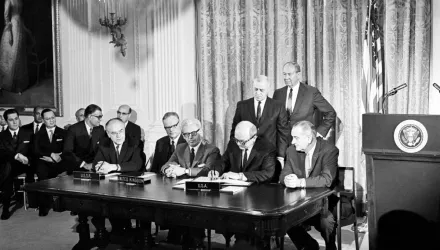Lieutenant General Mike Maples became Director of the Defense Intelligence Agency in November 2005. The Defense Intelligence Agency is a 7,500-person combat support agency with personnel deployed to more than 130 countries worldwide. In this post, Lieutenant General Maples also commanded the Joint Functional Component Command for Intelligence, Surveillance and Reconnaissance for the United States Strategic Command.
Prior to this, Lieutenant General Maples served as the Vice Director and Director of Management of the Joint Staff. Lieutenant General Maples’ command assignments include: Commanding General of the United States Army Field Artillery Center and Fort Sill, Oklahoma, and Chief of Field Artillery for the United States Army; Assistant Division Commander, 1st Armored Division, Baumholder, Germany; 41st Field Artillery Brigade, Babenhausen, Germany; 6th Battalion, 27th Field Artillery (MLRS) at Fort Sill, Oklahoma, Desert Shield/Desert Storm; and B Battery, 6th Battalion, 37th Field Artillery, 2nd Infantry Division, Republic of Korea. During Desert Storm, his battalion was the only unit in theater capable of firing the Army Tactical Missile System.
Lieutenant General Maples was assigned to Headquarters, Department of the Army, as the Director of Operations, Readiness and Mobilization, and Director of Military Support in the Office of the Deputy Chief of Staff for Operations and Plans. He served as the Deputy Chief of Staff for Operations and Intelligence, Allied Command Europe Rapid Reaction Corps (ARRC), and for the Kosovo Force (KFOR), Operation Joint Guardian. Other previous assignments include Assistant Chief of Staff, G3, V Corps, Heidelberg, Germany, and Deputy Chief of Staff for Operations for United States Army Europe (FWD), Taszar, Hungary, Operation Joint Endeavor.
A native of Bonham, Texas, he was commissioned a Second Lieutenant of Field Artillery in 1971 following graduation from the United States Military Academy, West Point, New York, and holds a master’s degree in organizational behavior from Pacific Lutheran University. His military education includes the Field Artillery Officer Advanced Course, the United States Army Command and General Staff College, and the National War College.
Lieutenant General Maples’ decorations include the Defense Distinguished Service Medal, the Distinguished Service Medal, the Defense Superior Service Medal with Oak Leaf Cluster, the Legion of Merit with two Oak Leaf Clusters, the Bronze Star Medal, the Meritorious Service Medal with three Oak Leaf Clusters, the Army Commendation Medal with Oak Leaf Cluster, and the Army Achievement Medal. Foreign decorations include the French Croix du Guerre with Silver Star.
Rolf Mowatt-Larssen is the current Director of the Intelligence Project at the Belfer Center. Previously, he was the Director of the Office of Intelligence and Counterintelligence at the U.S. Department of Energy and former head of the Central Intelligence Agency's WMD and terrorism efforts.
As Director of Intelligence and counterintelligence with the U.S. Department of Energy, Mowatt-Larssen and his 600-person organization were responsible for the areas of nuclear terrorism, nuclear proliferation, science and technology, energy security, and counterintelligence. His office also provided support to policymakers and conducts collection and analysis, with a special focus on harnessing U.S. scientific and technological expertise to solve intractable problems. His primary focus was to prevent a nuclear terrorism attack on the United States by working to keep nuclear weapons and weapons materials out of the hands of terrorists.
When he joined the Belfer Center, Professor Graham Allison said, "Since 9/11, Rolf Mowatt-Larssen has led the government's efforts to find and track potential nuclear terrorists and to prevent a nuclear terrorist attack on the U.S. Over a career of almost three decades in the intelligence community and at the Department of Energy, Rolf has likely learned more about the plans and potentials of al-Qaeda and other terrorist groups seeking to mount catastrophic terrorist attacks on the U.S. than anyone I know. He is deeply committed to preventing nuclear attacks and restoring a global order that will make that possible. We are extremely pleased to have him join our nuclear team."
In testimony presented to the Homeland Security and Governmental Affairs Committee of the U.S. Senate in April 2008, Mowatt-Larssen said he believed the world would be tested during the early years of the 21st century "in our ability to prevent non-state efforts to develop and detonate a nuclear weapon." He added: "...we must get nuclear materials off the black market and take every possible step to stop global trafficking in these materials. It must be a global effort incorporating police, intelligence services, militaries, government agencies and ministries, and dedicated citizens across the world. In addition, we need broad information sharing across every front -- between government and private sector, and among foreign partners, including those who previously were our adversaries. Al-Qa'ida thinks and plans dynamically and they rarely follow straight-forward, linear paths to their targets. We need to be just as flexible and dynamic in our efforts to stop them."
Prior to his appointment to the top intelligence position in the Department of Energy, Mowatt-Larssen served for 23 years as a CIA intelligence officer in various domestic and international posts. These included deputy associate director of Central Intelligence for Military Support, chief of the Weapons of Mass Destruction Department, Counterterrorism Center, and most recently chief of the Europe Division in the Directorate of Operations. His overseas assignments included service in Moscow, Stockholm, Athens, Zurich, and Oslo, among others. A graduate of the U.S. Military Academy at West Point, Mowatt-Larssen is the recipient of a number of awards including the CIA Director's Award, Distinguished Career Intelligence Medal, Commendation Medal, and Secretary of Defense Civilian Distinguished Service Medal.
Washington Post columnist David Ignatius wrote in October 2007 (in "Portents of a Nuclear Al-Qaeda"), "He [Rolf Mowatt-Larssen] is convinced that al-Qaeda is trying to acquire a nuclear bomb that will leave the ultimate terrorist signature -- a mushroom cloud.....[I]t's worth listening to his warnings -- not because they induce more numbing paralysis but because they might stir sensible people to take actions that could detect and stop an attack."
Mowatt-Larssen's work to prevent a nuclear terrorist attack on the U.S. also is highlighted in Ron Suskind's recent book The Way of the World.
Brigadier General Kevin Ryan (U.S. Army retired) is an Associate Fellow at Harvard Kennedy School’s Belfer Center for Science and International Affairs.
Until his retirement from full time work in May 2017, Ryan was founder and Director, Defense and Intelligence Projects at Belfer Center. A career military officer, he served in air and missile defense, intelligence, and political-military policy areas. From 1995 to 1996, he was head of the Moscow office of the POW/MIA Commission, searching for missing Americans in the former Soviet states. From 1998 to 2000, he served as Senior Regional Director for Slavic States in the Office of Secretary of Defense and, from 2001 to 2003, as Defense Attaché to Russia. He also served as Chief of Staff for the Army's Space and Missile Defense Command, an organization with diverse missions that include deployment of missile defenses, cyber assets, satellite management and research in areas like directed energy. He has commanded at every level from platoon to brigade and served in Europe, Korea, and Iraq. In his last duty assignment he was responsible for Army Strategic War Plans, Policy, and International Affairs and coordinated Army policy in the domestic interagency and with foreign allies.
Ryan holds a Bachelor of Science degree from the U.S. Military Academy, a Masters degree in Russian Language and Literature from Syracuse University and, a Masters degree in National Security Strategy from the National War College. Ryan has been a fellow at Harvard Kennedy School's Shorenstein Center on Press, Politics and Public Policy and was Vice President for Business Development at iRobot Corporation. He is a member of the Board of the American Councils for International Education (ACTR/ACCELS) and a member of the Belfer Center Board of Directors. Ryan was the founding director of the center's U.S.-Russia Initiative to Prevent Nuclear Terrorism, where he also founded the “Elbe Group" (retired US and Russian flag officers from the military and intelligence fields). He was previously Executive Director for Research of the Belfer Center from 2010 to 2013. He is the author of over 20 articles and book chapters on various leadership and security topics.



